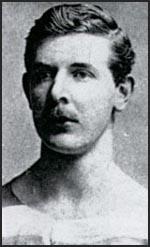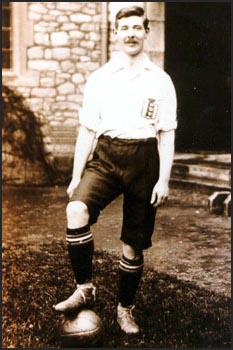Evelyn Lintott

Evelyn Henry Lintott, the son of Arthur Frederick and Eleanor L. Lintott, was born in Godalming, on 2nd November, 1883. The family lived at Hazelville, Wolseley Rd., Farncombe, Surrey.
He attended St. Luke's College. A talented footballer he played football for Woking and Plymouth Argyle in the Southern League.
Lintott came from a wealthy family and never became a professional footballer. In 1906 the Football Association began organizing amateur internationals. Lintott was selected to play at left-half. Also in the team was the great Vivian Woodward. The England team went on an international tour and in their first game they beat France 15-0 with Woodward scoring eight goals.
In 1907 Lintott joined Queens Park Rangers. He made his debut in the second home game of the season against New Brompton. Despite his amateur status, Lintott won his first full international cap on 15th February 1908 against Ireland. Also in the England team that day was Bob Crompton, George Hilsdon, George Wall, William Wedlock and Vivian Woodward. England won 3-1. Lintott kept his place in the team and also played against Wales (7-1) and Scotland (1-1). Lintott was QPR's first player to win international honours.
In 1907 Billy Meredith and several colleagues at Manchester United, including Charlie Roberts, Charlie Sagar, Herbert Broomfield, Herbert Burgess and Sandy Turnbull, decided to form a new Players' Union. The first meeting was held on 2nd December, 1907, at the Imperial Hotel, Manchester. Also at the meeting were players from Manchester City, Newcastle United, Bradford City, West Bromwich Albion, Notts County, Sheffield United, and Tottenham Hotspur. Jack Bell, the former chairman of the Association Footballers' Union (AFU) also attended the meeting.
Herbert Broomfield was appointed as the new secretary of the Association Football Players Union (AFPU). It was decided to charge an entrance fee of 5s plus subs of 6d a week. Billy Meredith chaired meetings in London and Nottingham and within a few weeks the majority of players in the Football League had joined the union. This included Andrew McCombie, Jim Lawrence and Colin Veitch of Newcastle United who were to become important figures in the AFPU. Despite being someone who was not paid wages, in an act of solidarity, Evelyn Lintott, joined the AFPU and was later elected as its chairman.
The AFPU also got support from administrators of the clubs. John J. Bentley (president) and John Henry Davies (chairman) of Manchester United joined the campaign to abolish the £4 ceiling on wages.
At the 1908 Annual General Meeting the Football Association decided to reaffirm the maximum wage. However, they did raise the possibility of a bonus system being introduced whereby players would receive 50% of club profits at the end of the season.
The AFPU continued to have negotiations with the FA but in April 1909 these came to an end without agreement. In June the FA ordered that all players should leave the AFPU. They were warned that if they did not do so by the 1st July, their registrations as professionals would be cancelled. The AFPU responded by joining the General Federation of Trades Unions.
In 1909 Queens Park Rangers was in serious financial difficulty. In order to help QPR he became a professional and was sold to Bradford City in the First Division of the Football League for over £1,000. Lintott had only played 35 games for QPR.
Lintott helped Bradford City avoid relegation to the Second Division in the 1908-09 season. He also retained his place in the England team and played in all four international games in 1909. This included victories over Ireland (4 v 0), Scotland (2-0) and Hungary (4-2 and 8-2).

Bradford City finished in 7th place (1909-1910) and 5th place (1910-1911). Bradford also beat Newcastle United in the 1911 FA Cup Final 1-0.
After scoring two goals in 53 games for Bradford City, Lintott was persuaded by Herbert Chapman to join Leeds City in the Second Division of the Football League. He played 43 games for his new club before retiring from football in 1913.
On the outbreak of the First World War Lintott applied for a commission in the British Army. He eventually joined the 17th Service (Football) Battalion of the Middlesex Regiment as a second lieutenant. The Football Battalion had been founded on 12th December 1914 by William Joynson Hicks. Other members of this regiment included Walter Tull and Vivian Woodward.
On 15th January 1916, the Football Battalion reached the front-line of the Western Front. During a two-week period in the trenches four members of the Football Battalion were killed and 33 were wounded. This included Vivian Woodward who was hit in the leg with a hand grenade. The injury to his right thigh was so serious that he was sent back to England to recover.
Lieutenant Evelyn Lintott was later transferred to the West Yorkshire Regiment. He was killed on the first day of the Somme on 1st July 1916.
Primary Sources
(1) Frederick Wall, 50 Years of Football (1935)
Although born at Chirk, the nursery of Welsh football, and taught football by the local schoolmaster, Mr. T.E. Thomas, Meredith never spoke Welsh, and he was "hot and bothered" when compatriots began to shower congratulations and compliments upon him in their native Celtic tongue. He seemed more annoyed than pleased, but his mixed feelings can easily be understood.
More of a footballer than a linguist, he was one of the greatest outside-rights who ever played. There can be argument without end when the champions of W.I. Bassett, "Jocky" Simpson and Meredith meet.
A man who always kept himself in perfect condition by an abstemious life, his sole method of training was ball practice. Being spare of habit and lean in limb, two days a week sufficed to keep him fit for the game during 25 years.
An expert dribbler, blessed with sufficient speed, he hugged the touch line, and very often took the ball up to the corner flag before making his centre. His defence of going so far was that all his fellow forwards were on-side when they were behind the ball. This was good logic, even if it be not a fashionable plan in these days.
Not only was he a great dribbler, but he was crafty and cunning in hoodwinking opponents. No man was ever more wary of the outstretched leg for a trip. He hopped over the trap as if it was a twig.
Of the back-heel pass he was a ready exponent, and he remains the only man I have ever seen chewing a quill toothpick while playing in the hardest of matches. Indeed, his toothpick was just as characteristic of him as his bandy legs.
In his day he was a splendid raider, and one of the Manchester City directors, Mr. Joshua Parlby, always declared that he should have been a centre-forward. Possibly goalkeepers were thankful that he was not, for he obtained over 200 goals from outside right.
A good story relates to the Wales v. England match on Wrexham racecourse, in 1908. It was disastrous to Wales, for that was the occasion when L.R. Roose was injured, and in the second half Dai Davies was allowed to keep goal.
Evelyn Lintott, the talented schoolmaster, who was so fine a left half-back, played in all the big matches of 1907-08, and on this occasion he was ordered never to leave Meredith. He clung to him like an affectionate brother.
At last the patience of Meredith gave out and he turned on Lintott with these words: "Go away, you confounded schoolboy. Go away! Do you hear? You have got seven cursed goals, how many more do you want?"
Lintott was silent, but he continued to haunt his jaded adversary. Wales have had lots of fine players, but their football prince remains Meredith the magnificent.
(2) J. A. H. Catton, The Story of Association Football (1926)
The match between Wales and England at, Wrexham in 1908 lingers in memory for two reasons. First, this was Evelyn Lintott's only game against Wales. I had a liking for Lintott, both as a man, when he was chairman of the Players' Union, and as a player, for I first saw him in the jersey of Queen's Park Rangers, while he was an amateur, and knew him when he moved to Yorkshire.
On this occasion at Wrexham Evelyn Lintott had received instructions that he was not to give Meredith a yard of room; that he was never to leave him. I cannot imagine that this was the style of game which commended itself to such a sporting half-back, as instead of being a mere stumbling-block he would sooner have met skill with skill.
Nevertheless, he carried out his orders so loyally and rigidly that Meredith could not move. In the second half, when England had an overwhelming lead, Meredith turned upon Lintott and said: "For God's sake, go away. England has got seven goals. How many more do you want? Are you frightened of being beaten now?"
The indignation of the wily Welshman amused Lintott, but he never relaxed his grip until time had expired, and then he laughed at Meredith, who had not a smile in him.
It was in this match that Leigh R. Roose was injured in the first half. He remained at his post until the interval. In the dressing-rooms Roose had an unpleasant conversation with the English selectors, who thought that the speech of the goalkeeper was not such as might be expected from a gentleman.
(3) Billy Meredith, Thompson's Weekly News (December 1909)
What is more reasonable than our plea that a footballer with his uncertain career should have the best money that he can earn? If I can earn £7 a week, why should I be debarred from receiving it? I have devoted my life to football and I have become a better player than most because I have denied myself much that men prize. A man who takes the care of himself that I have ever done and who fights the temptations of all that can injure the system surely deserves some recognition and reward!
They (the players) are, as a whole, an over-generous careless race who do not heed the morrow or prepare for a rainy day as wise men would. This trait in the character of the players has been taken advantage of over and over again by club secretaries in England. Many a lad has been tricked into signing on by vague verbal promises deliberately made to be forgotten once the ink was dry on the form. It is only recently that with steady improvement in the class of men playing the game as professionals the players have seen the folly of the careless life and have realized that they have too long put up with indifferences and injustices of many kinds. The only way to alter this state of things was by united action hence the formation and success of the Players' Union with its 1300 paying members at the end of the first year...
What opens the door to irregular payments is the rank injustice of the £4 per week limit and of the transfer system which gives a club £1000 for a player and allows the latter - one really ought to call him the goods -£10. If the £10 went to the club and the £1000 to the man whose ability it is the agreed value of, there would be more justice in it.
